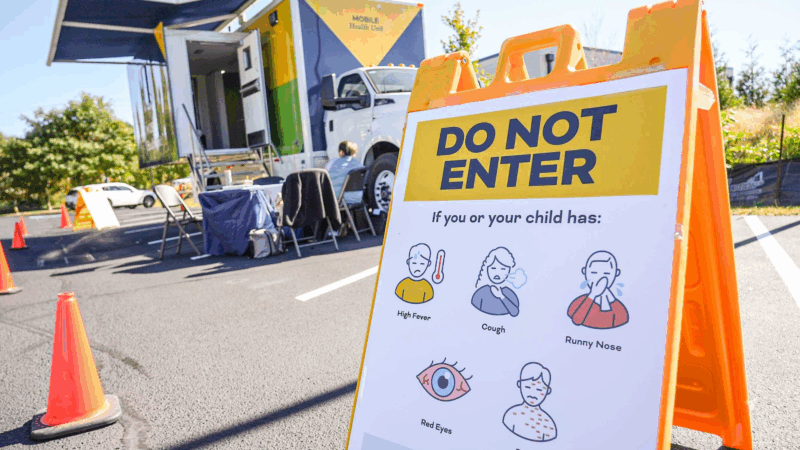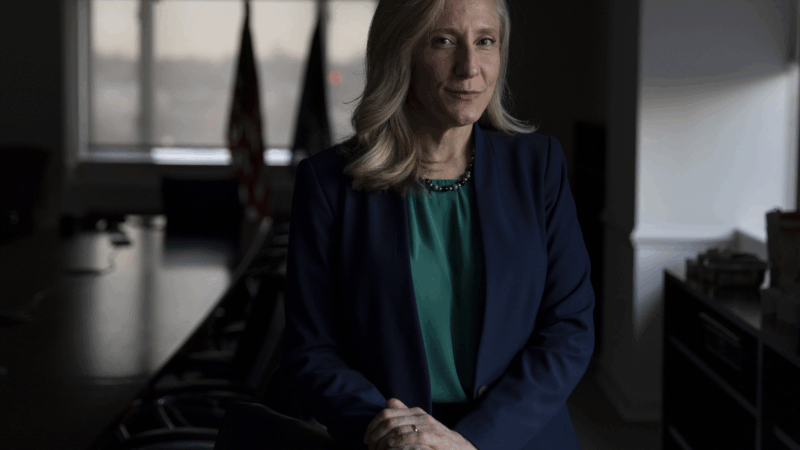Common Core: Can Standards Really Prepare Students for College?
Over the last two years, there has been a lot of debate surrounding the Common Core standards throughout the country. But sometimes, all the political noise can make us forget about the main goal of these standards. Do they really do a better job of preparing kids for college and careers? And if not, what’s stopping them? This week, the Southern Education Desk has been looking at the standards and how they’re being implemented across the South. Nina Feldman in New Orleans has this report.
It’s Saturday on the University of New Orleans lakefront campus, where Glen Sylvan just finished his freshman year. Sylvan suggested we meet today because the weekdays are tough for him because studying takes up most of his time. Glen went to KIPP Renaissance High School in New Orleans, where he was an athlete and a popular guy. He loved it there, but, he says, most of his instruction was geared toward test prep.
“I would say for KIPP, the focus was results,” says Sylvan. “KIPP was like, ‘Hey, this is what we need to learn about in the year because we gotta pass the EOC, this ACT.’”
In college though, Sylvan says it’s different.
“When you are at a university, It’s not like you have those intermediate classes to give you some type of leeway into easing into the assignment. It’s like, ‘No, here’s a five page essay, start on it immediately.’”
The Common Core standards are designed to prepare young people like Sylvan to hit the ground running when they get to college or to work. Rebecca Kockler is the assistant superintendent for academic content at the Louisiana Department of Education. She says that the standards are designed to ensure students not only learn the basics, but can actually use them.
“The standards ask students, to ‘do something with that’ so they can actually apply that in multiple settings. So they can really get into more complex problem solving, read longer and more complex text. “
Kockler says that the state relied on higher education when they set the standards. They worked closely with the Cain Center at Louisiana State University. Brenda Nixon is co-director there. She says they were glad to help. If the standards are designed to prepare high schoolers for college, who better to help set them than colleges.
“ It’s really I would say a selfish reason in some respects that universities work with the public school and private school populations,” Nixon says. “Most of our students in Louisiana go to our state universities.”
Brian Beabout teaches in the educational leadership program at the University of New Orleans and studies educational change. He says that the new standards could work to prepare students, but it’s not fair to expect that overnight.
“I think the number one biggest challenge in implementing Common Core and the PARCC (Partnership for Assessment of Readiness for College and Careers assessments is that they’ve been done in an environment where there’s very little room for teachers to make mistakes.”
Beabout says that the PARCC exam, the one that assesses the Common Core standards, is just another test to add to the mix in what’s already a high stakes climate.
“If I were to take my son out and put him on a bike for the first time and say if you don’t make it to the end of the block without falling off, you don’t get dinner tonight, that’s probably not going to be a very successful outing. But in essence, that’s the situation we’ve put our teachers in.”
Student performance on standardized testing can determine a teacher’s and a school’s future. Common Core is another thing to add to a teachers plate. So even if teachers like the new standards, mixing them in is going to be a tight squeeze. Glen Sylvan remembers it being hard for his high school teachers to be creative the way his professors are.
“College is like “jump out of your shell, beyond on this level.” And we did have some teachers that was like that, but it was only like so many teachers that did that, but it was within a system, so you can only go so far with it.”
But, Nixon from the Cain Center says nobody’s asking teachers to do it alone. The Cain Center holds professional development workshops for teachers to help them integrate the standards into the classroom. She admits it will take time.
“It’s not coming to a workshop for six hours and thinking ‘ ok now I can teach math.’ Because we’re finding that our teachers don’t have the depth of content knowledge to teach it appropriately. So one of the things that the professional development does, is teach the content.
The danger, according to Beabout, of asking teachers to prioritize common core, is that they’ll end up only focusing on math and English – the two areas that the PARCC exam assesses. That narrowing of curriculum, he says, actually does a disservice to sudents., because that’s not what makes someone college ready.
“So I think the schools who are going to come out best in this transition are the ones who are thinking about what are the diversity of places that these more conceptual skills can be taught?”
Rising UNO sophomore Glen Sylvan agrees. Colleges are looking for more than just good test scores.
“Communication. Global awareness. Critical thinking skills, things like that. They wanted you to be well rounded.”
Teaching those skills, and testing them, is a tall order.
This report is supported by a grant from the Corporation for Public Broadcasting. You can review the full series at www.southerneducationdesk.org.
Justice Department opens investigation into Minnesota governor and Minneapolis mayor
Federal prosecutors are investigating Gov. Tim Walz and Mayor Jacob Frey.
No sign of new protests in Iran as a hard-line cleric calls for executions
A Iran returns to an uneasy calm after protests led to a violent crackdown, a senior cleric is calling for the death penalty for detained demonstrators. His sermon Friday also threatened U.S. President Trump.
Gulf South food banks look back on a challenging year as another shutdown looms
Federal funding cuts and a 43-day government shutdown made 2025 a chaotic year for Gulf South food banks. For many, the challenges provide a road map for 2026.
Measles is spreading fast in S.C. Here’s what it says about vaccine exemptions
More than 550 people have contracted measles in Spartanburg County, S.C., in a fast-growing outbreak. Like a majority of U.S. counties, nonmedical exemptions to school vaccination are also rising.
It took 75 governors to elect a woman. Spanberger will soon be at Virginia’s helm
Abigail Spanberger, a former CIA officer and three-term congresswoman, is breaking long-held traditions on inauguration day. She says she wants her swearing-in to showcase the state's modern vibrancy.
For those with addiction, going into and coming out of prison can be a minefield.
Many jails and prisons around the country don't provide medication treatment for opioid use disorder. Studies show that medication makes recovery more likely and reduces the risk of overdose death.







